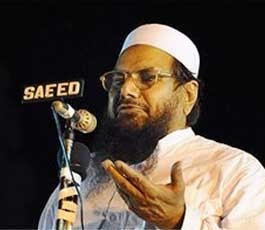Muzaffarabad, Pakistan (Reuters): Militants on the Pakistan side of divided Kashmir say they will give new talks with India a chance, but they have little faith they will succeed and believe it is only a matter of time before they will have to fight again.
For now, many of them are engaged in peaceful pursuits such as small businesses, teaching or social welfare, and they face severe Pakistani restrictions on crossing the so-called Line of Control (LoC) separating Pakistani and Indian Kashmir.
“We have not given up arms, jihad, but are just giving another chance to talks,” Abdul Aziz Alvi, chief of Jamaat-ud-Dawa (JuD) in Pakistani Kashmir, told Reuters.
The JuD is an Islamist charity which the United Nations says is a front for Lashkar-e-Taiba, one the main militant groups fighting Indian rule in Kashmir and blamed for a 2008 attack on the Indian city of Mumbai that killed 166 people.
“If India does not understand the language of negotiation, then guns will start speaking,” Alvi said as he was attending a protest rally against Indian plans to build dams in its part of Kashmir.
India and Pakistan last month agreed to restart comprehensive talks which were called off by India after the attacks on Mumbai by militants based in Pakistan.
Mostly Muslim Kashmir has been at the heart of rivalry between the neighbors since British-ruled India was divided into independent India and Pakistan in 1947.
The Himalayan region, which both countries claim in full but rule in part, was the cause of two of the three wars they have fought since then.
India has long accused Pakistan of fomenting an insurgency in which nearly 50,000 people have been killed since it broke out in 1989. Pakistan denies the charge.
The bitterness generated by the dispute has an impact far beyond Kashmir’s snow-capped mountains and lush valleys, including in Afghanistan, where many analysts say India and Pakistan are waging a proxy war.
India supports the U.S.-backed Kabul government while Pakistan, worried about hostile neighbors on both borders, secretly backs the Taliban in the hope of eventually ensuring a friendly Afghan government, analysts say.
Since 2002, the Kashmir militants’ movement over the LoC has fallen significantly, partly because India has fenced the previously porous frontier but also because Pakistan has imposed tough restrictions on the movement of the fighters.
CONTROLLING THE LINE OF CONTROL
“There’s been a huge impact. Previously, about 50 mujahideen (Islamist fighters) used to cross to occupied Kashmir a month, now hardly five are able to do so,” said Abu Huzaifa Kashmiri, a member of the Harkat-ul-Mujahideen militant group, who now runs a hotel in Muzaffarabad, capital of Pakistani Kashmir.
Pakistan has always denied arming the militants and sending them to fight Indian forces but the plight of Kashmir’s Muslims is an emotive issue in Muslim Pakistan and all governments have trumpeted their political support for the separatists in what it calls Indian-occupied Kashmir.
But Pakistan has been under U.S. pressure to stop militant attacks into India and with the talks with India set to resume, it is keeping the militants on a short leash.
“Their activities are under watch,” said a security official in the region said.
But some militants have gone rogue and the chances of another attack in India, which could not only scupper the talks and even raise the prospect of a clash between the nuclear-armed neighbors, is possible.
“There are chances that some rogue elements come out and conduct operations like Mumbai, but the (militant) leadership does not seem ready for any confrontation with the (Pakistani) establishment,” said defense analyst Hasan Askari Rizvi.
“It has to be seen how the militant leadership and establishment control these rogue elements.”
A senior militant commander, who declined to be identified, said the failure of India and Pakistan to settle the dispute would ultimately benefit the militants.
“The breakdown of the talks will give impetus to our movement and justify our argument that India is not serious about resolving the issue but uses talks to drag it out.”
Uzair Raza, a militant from Indian Kashmir, sitting in a tea-shop in the Manikpiyan refugee camp on a Pakistani bank of the Jhelum River, said hundreds of new fighters could be raised if necessary.
“If we are not free, our land is occupied, then why should we care about peace? We’ll fight for our rights,” he said.
Tens of thousand Kashmiris have migrated to Pakistan from Indian Kashmir since the insurgency began. Many, like Naseema Bibi, 50, say they will not go home until they get “freedom.”
“I don’t mind begging here but I’ll not live under India’s slavery,” said Bibi, who runs a vegetable shop in the camp near Muzaffarabad.























